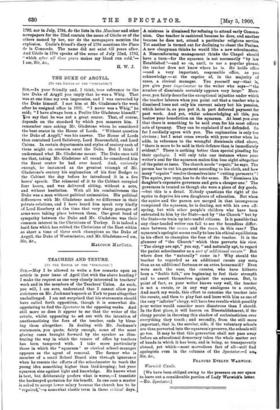THE DUKE OF ARGYLL.
[To THE EDITOR OF TUE "SPECTATOR."] SIR,—In your friendly and, I think, true reference to the late Duke of Argyll you imply that he was a Whig. That was at one time my own impression, and I was corrected by the Duke himself. I met him at Mr. Gladstone's the week after he resigned office in 1881. "I never was a Whig," he said; "I have always been a Peelite like Gladstone himself." Ion say that he was not a great orator. That, of course, depends on the standard by which you measure him. I remember once asking Mr. Gladstone whom he considered the best orator in the House of Lords. "Without question the Duke of Argyll," was his answer. The House of Lords then contained Lord Salisbury, Lord Beaconsfield, and Lord Cairns. In certain departments and styles of oratory each of these might on occasion excel the Duke. But I think I understand what Mr. Gladstone meant. The Duke once told me that, taking Mr. Gladstone all round, he considered him the finest orator he had ever heard. And, curiously enough, he instanced as the greatest triumph of Mr. Gladstone's oratory his explanation of his first Budget to the Cabinet the day before he introduced it in a five hours' speech. The rehearsal of it to the Cabinet occupied four hours, and was delivered sitting, without a note, and without hesitation. With all his combativeness the Duke was a man without political animosities. His political differences with Mr. Gladstone made no difference in their private relations, and I have heard him speak very kindly of Lord Rosebery at the time that very sharp passages of arms were taking place between them. One great bond of sympathy between the Duke and Mr. Gladstone was their common interest in the Christians of Turkey. It is indeed a hard fate which has robbed the Christians of the East within so short a time of three such champions as the Duke of Argyll, the Duke of Westminster, and Mr. Gladstone.—I am, Sir, &c., MaLcofx MAC COLL.






































 Previous page
Previous page